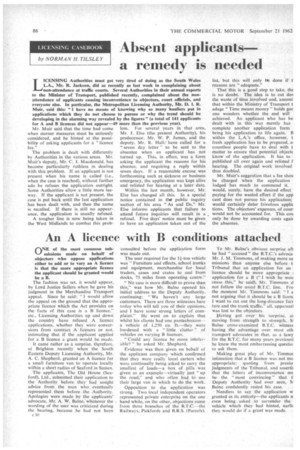An A licence with B conditions attached
Page 88

If you've noticed an error in this article please click here to report it so we can fix it.
inNE of the most common sub
• -" missions made on behalf of objectors who oppose applications either to add or to vary an A licence Is that the more appropriate licence the applicant should be granted would be a B.
The fashion was set, it would appear, by Lord Justice Sellers when he gave his judgment in the Merchandise Transport appeal. Since he said: "I would allow the appeal on the ground that the appropriate licence which the Act Provides on the facts of this case is a B licence," etc., Licensing Authorities up and down the country have refused A licence applications, whether they were conversions from contract A licences or not. intimating that if the applicant applied for a B licence a grant would be made.
It came rather as a surprise, therefore. at Brighton recently when the South Eastern Deputy Licensing Authority, Mr. A. C. Shepherd, granted an A licence for a small furniture van to operate locally within a short radius of Seaford in Sussex.
The applicants, The Old House (Seaford), Ltd., submitted their application to the Authority before they had sought advice from the man who eventually represented them before the Authority. Apologies were made by the applicants' advocate, Mr. A. W. Elaine, whenever the wording of the user was criticieed during the hearing, because he had not been consulted before the application form was made out.
The user required for the 13,-ton vehicle was " Furniture and effects, school trunks and equipment, merchandise for local traders, cases and crates to and from docks, 75 mites from operating centre."
"No case is more difficult to prove than this," was how Mr. Balm opened his initial address to the Deputy Authority, continuing: "We haven't any large customers. There are three witnesses here today who will tell you of their opinions, and I have some strong fetters of complaint." He went on to explain that whilst his clients bad one pantechnicon-a vehicle of 1,250 cu. ft —they were burdened with a "little clutter" of vehicles on varying B licences.
'Could any licence he more intolerable?" he asked Mr. Shepherd.
Evidence was then given on behalf of the applicant company which confirmed that they were really local carters who were continually being asked to carry the smallest of loads—a box of pills was given as an example—virtually just "up the road," and who often had to use their large van in which to do the work.
Opposition to the application was strong. Two local independent operators represented private enterprise on the one hand while, on the other, objections came from three branches of the B.T.C.—the Railways, Pickfords and B.R.S. (Parcels), To Mr. Baines obvious surprise all he had " accused " the B.T.C.'s advoc.a. Mr. J. M. Timmons, of making more su missions than anyone else before t Tribunal that an application for an licence should be more appropriate application for a B (" I wish he wou cease this," he said), Mr. Timmons d not follow the usual B.T.C. line. Fro the moment Mr. Timmons said: "1 a not arguing that it should be a B licent I want to cut out thc long-distance furt tore and the trunk traffic," all, apparent) was lost to the objectors, L-laving got over his surprise. al moving from strength to strength, /V Balne • cross-examined B.T.C. witness having the advantage over most oth transport advocates in that, as a lawy for the FI.T.C. for many years previous] he knew the most embarrassing questio to ask them.
Making great play of Mr. Timmor intimation that a B licence was not ma appropriate; quoting from previa judgments of the Tribunal, and assertii that the letters of inconvenience me be the "most convincing" that t Deputy Authority .had ever seen, IV Balne confidently rested his ease,
Needless to say the application w granted in its entirety—the applicants n even being asked to surrender the vehicle which they had hinted. earIi( they would do if a grant was made.










































































































































































































































































































































